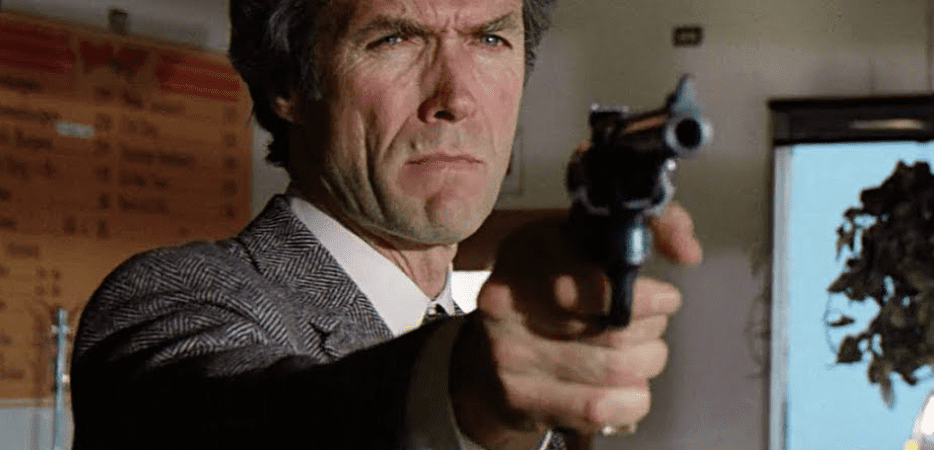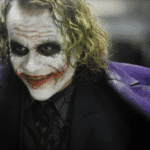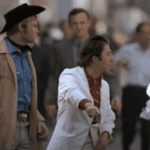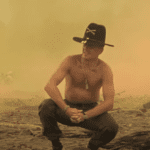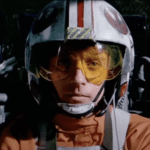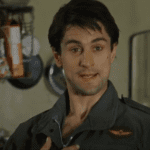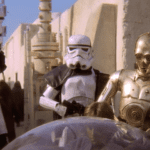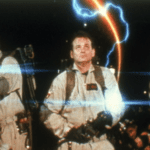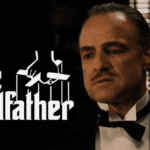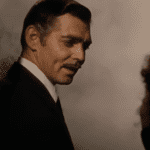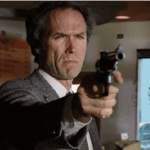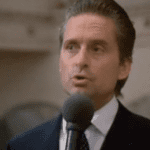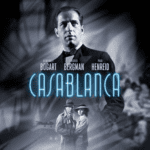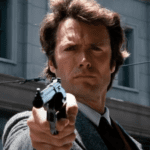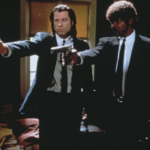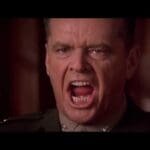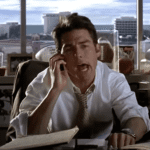The ‘Dirty Harry’ franchise, a cornerstone of American cinema, has captivated audiences since its inception in the early 1970s. This series primarily revolves around the resolute and gritty San Francisco police inspector, Harry Callahan, masterfully portrayed by Clint Eastwood. Callahan’s character is emblematic of a tough, no-nonsense cop wielding a .44 Magnum, known for his brusque demeanor and unyielding approach to justice. The franchise not only explores themes of law enforcement and morality but also reflects the socio-political climate of its times.
The original Dirty Harry movie from 1971 also included an iconic movie quote “Do You Feel Lucky Punk” which is actually misquoted! Find out the full story here
As well as the famous quote “Go Ahead Make My Day” which featured at Number 6 in the American Film Institutes 100 Greatest Movie Quotes, it also has another iconic quote in the same scene.
When Callaghan tells one of the diner robbers “Whoa…we’re not just gonna let you walk out of here.” the robber responds “Who’s “we”, sucka?”
Callaghan responds with “Smith, and Wesson, and Me” pulling out his .44 magnum
‘Sudden Impact,’ the fourth installment of the ‘Dirty Harry’ series released in 1983, stands out for multiple reasons. This film marks Eastwood’s directorial debut within the franchise, giving him creative control over the narrative direction and character development. The plot follows Callahan as he investigates a series of violent crimes that are linked to a woman seeking revenge for her past traumas. This narrative arc provides a compelling backdrop that allows for an exploration of justice from a more personal lens, contrasting with the straightforward procedural nature of the previous films.
The Significance of ‘Go Ahead, Make My Day’
The phrase ‘Go ahead, make my day’ has transcended its cinematic origins to become a staple of popular culture. Its significance lies not only in its immediate context within the film but also in its broader interpretations and influence on society. The line encapsulates Harry’s unapologetic defiance and rugged masculinity, embodying the ethos of a vigilante who takes matters into his own hands. Moreover, this catchphrase serves as a bold invitation for confrontation, reflecting Callahan’s moral ambiguity and his willingness to challenge the status quo.
Cinematic tools often include specific dialogues that resonate deeply with audiences, and this phrase exemplifies such a tool, effectively showcasing Callahan’s character. The moment emphasizes his bravado, presenting him as both a protector and a danger to those who operate outside the law. This duality invites viewers to consider the complexities of justice and morality, provoking discussions about the fine line between right and wrong. Furthermore, the quote has been adapted in various contexts across media, reinforcing Harry’s persona as a fearless protector in the face of chaos.
Beyond the confines of the film, ‘Go ahead, make my day’ has found its way into everyday vernacular, symbolizing a challenge or a desire for action. Its integration into popular culture can be observed in various forms, from political rhetoric to popular music, demonstrating the line’s enduring impact. As societal attitudes evolve, so too does the interpretation of Harry’s challenge—once a rallying cry for individual empowerment, it may now also elicit discussions about the repercussions of unchecked aggression. Ultimately, the legacy of this phrase underscores its cultural relevance, cementing Harry Callahan’s character as an emblem of audacity in a world rife with challenges.
The famous quote is delivered early in the film as Harry Callaghan stops a robbery in progress at his favourite diner. He despatches each of the robbers until only one is left who has taken a hostage. At this point rather than holster his gun and defuse the situation, Callaghan cocks his gun points it at the robber and snarls “Go ahead, make my day” almost encouraging the robber to harm the hostage so he would be able to wreak his particular brand of justice.
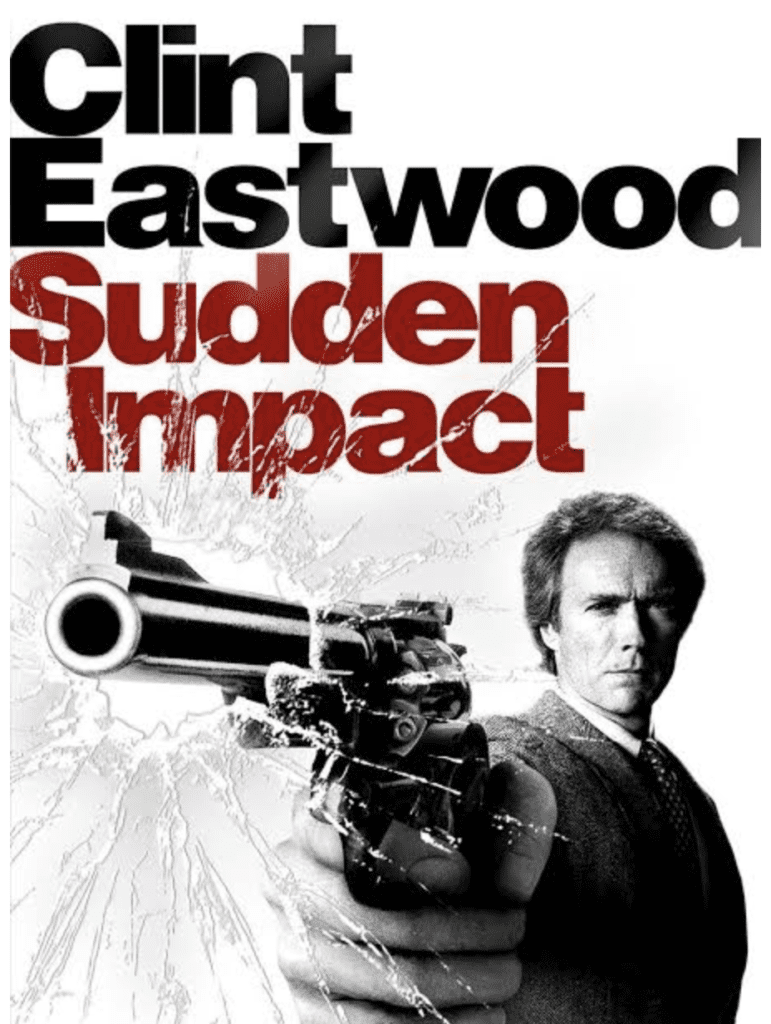
Themes of Justice and Vengeance
In the film “Sudden Impact,” the themes of justice and vengeance are intricately woven into the narrative, reflecting the complexities of moral choices individuals face in their pursuit of retribution. The character of Inspector Harry Callahan, often regarded as the embodiment of vigilante justice, grapples with the implications of taking the law into his own hands. This portrayal raises questions about the ethical boundaries of justice and the psychological consequences that ensue when individuals choose to operate outside the confines of legal frameworks.
The storyline centers around the character of Jennifer Spencer, who enacts her own form of justice after suffering a traumatic assault. Her actions serve as a catalyst for discussions surrounding the concept of personal vengeance. While society often portrays punishment as a collective responsibility, “Sudden Impact” challenges viewers to consider the impact of individual agency in matters of crime and retribution. The film subtly critiques the traditional justice system’s limitations and offers a narrative that complicates the simplistic dichotomy of right and wrong.
This exploration of justice is particularly relevant in contemporary discourse, where debates about the efficacy of legal justice persist. The desire for immediate retribution, as depicted through Jennifer and Harry’s actions, reflects a societal frustration with the perceived inadequacies of the legal system. Moreover, the psychological ramifications of such choices can lead to a cycle of violence, as both characters grapple with their own morality while acting as agents of vengeance. Their stories prompt audiences to ponder the broader implications of justice, often leaving them questioning whether true justice can ever be realized through personal vendettas.
Ultimately, “Sudden Impact” intricately portrays the society’s struggle with the nuances of justice and vengeance, compelling viewers to reflect on the moral dilemmas that arise when individuals confront the idea of taking justice into their own hands.
Reception and Legacy of Sudden Impact
Upon its release in 1983, ‘Sudden Impact’ was met with a mixed reception from critics, yet it proved to be a commercial success. The film, directed by Clint Eastwood, succeeded in revitalizing the ‘Dirty Harry’ franchise, grossing over $70 million at the box office. This figure made it one of the highest-grossing films in the series, illustrating the continued interest in the iconic character of Inspector Harry Callahan, portrayed by Eastwood. Critics praised Eastwood’s performance and the gritty narrative, while some expressed concerns regarding its heavy reliance on violence.
The film introduced the memorable line, “Go ahead, make my day,” which has since become synonymous with not only the ‘Dirty Harry’ franchise but also popular culture at large. This catchphrase symbolizes the tough, unyielding nature of Callahan and has been referenced and parodied in various media, further cementing the film’s place in cinematic history. ‘Sudden Impact’ is also notable for its exploration of themes such as revenge and justice, which resonate with audiences, contributing to its lasting impact on the action genre.
Over the years, ‘Sudden Impact’ has garnered a cult following, with many fans considering it one of the strongest installments of the ‘Dirty Harry’ series. Its influence extends beyond the immediate franchise; the film’s darker tone and moral ambiguity have inspired numerous subsequent action films that seek to delve into similar themes. Even today, it prompts discussions regarding vigilante justice and ethical considerations in law enforcement. As the ‘Dirty Harry’ series evolved, the legacy of ‘Sudden Impact’ continued to shape the narrative and expectations for action films, reflecting its significant place in cinematic history.
The Full Dirty Harry Quote – Go Ahead Make My Day – Sudden Imact
Crook: [during a diner robbery] What’s you doing, you pighead sucka?
Harry Callahan: Every day for the past ten years, Loretta there’s been giving me a large black coffee; today she gives me a large black coffee, only it has sugar in it. A lotta sugar. I just came back to complain. Now, you boys put those guns down.
Crook: Say what?
Harry Callahan: Whoa…we’re not just gonna let you walk out of here.
Crook: Who’s “we”, sucka?
Harry Callahan: [puts his coffee on the table] Smith…and Wesson…and me.
[Harry shoots the crook and kills him, and a gunfight ensues which ends with Harry threatening a robber at gunpoint]
Harry Callahan: Go ahead, make my day!
More Movie Quotes To Inspire You
- Why So Serious? – The Dark Knight
 Introduction to The Dark Knight and The Joker Ever wondered why a movie quote haunts us even years after its release? The Dark Knight offers lines so impactful they’ve etched themselves into pop culture, with none more famous than the Joker’s taunting query, “Why so serious?” Introduction to this cinematic marvel is almost unnecessary, but… Read more: Why So Serious? – The Dark Knight
Introduction to The Dark Knight and The Joker Ever wondered why a movie quote haunts us even years after its release? The Dark Knight offers lines so impactful they’ve etched themselves into pop culture, with none more famous than the Joker’s taunting query, “Why so serious?” Introduction to this cinematic marvel is almost unnecessary, but… Read more: Why So Serious? – The Dark Knight - “I’m Walking Here, I’m Walking Here” – Midnight Cowboy
 Ever feel like the world might just run you over if you don’t stand your ground? Imagine navigating the chaotic streets of NYC in the ’60s. Sounds intense, right? Well, that’s exactly what happens in the iconic scene from Midnight Cowboy where Dustin Hoffman’s character boldly claims his turf with ‘I’m walking here!’ What’s even… Read more: “I’m Walking Here, I’m Walking Here” – Midnight Cowboy
Ever feel like the world might just run you over if you don’t stand your ground? Imagine navigating the chaotic streets of NYC in the ’60s. Sounds intense, right? Well, that’s exactly what happens in the iconic scene from Midnight Cowboy where Dustin Hoffman’s character boldly claims his turf with ‘I’m walking here!’ What’s even… Read more: “I’m Walking Here, I’m Walking Here” – Midnight Cowboy - “I Love the Smell of Napalm in the Morning” – Apocalypse Now
 Imagine waking up at dawn, surrounded by thick jungle, the air heavy with tension. Then, boom! The unmistakable scent of sweeping devastation—napalm. It’s chaotic, surreal, and strangely, some say it’s beautiful. Sounds wild, right? That’s war in Apocalypse Now, friends. Ready to dive into the psyche behind one of cinema’s most enduring lines? It’s more… Read more: “I Love the Smell of Napalm in the Morning” – Apocalypse Now
Imagine waking up at dawn, surrounded by thick jungle, the air heavy with tension. Then, boom! The unmistakable scent of sweeping devastation—napalm. It’s chaotic, surreal, and strangely, some say it’s beautiful. Sounds wild, right? That’s war in Apocalypse Now, friends. Ready to dive into the psyche behind one of cinema’s most enduring lines? It’s more… Read more: “I Love the Smell of Napalm in the Morning” – Apocalypse Now - May The Force Be With You – Star Wars
 “May the Force Be With You” – An Iconic Star Wars Quote One of the most recognizable phrases in cinema history, “May the Force be with you,” has become synonymous with the Star Wars franchise. This simple yet powerful line encapsulates the essence of hope, guidance, and the struggle between good and evil. Recognised by The American Film Institute… Read more: May The Force Be With You – Star Wars
“May the Force Be With You” – An Iconic Star Wars Quote One of the most recognizable phrases in cinema history, “May the Force be with you,” has become synonymous with the Star Wars franchise. This simple yet powerful line encapsulates the essence of hope, guidance, and the struggle between good and evil. Recognised by The American Film Institute… Read more: May The Force Be With You – Star Wars - You Talkin’ To Me? – Taxi Driver – Robert De Niro
 Think you know movie quotes? Hold on tight because “You talkin’ to me?” might just be the most enigmatic of them all. Dive into a world where one phrase encapsulates societal angst and alienation with gripping intensity. Travis Bickle, played by the legendary Robert De Niro, interrogates not just his surroundings but his very existence.… Read more: You Talkin’ To Me? – Taxi Driver – Robert De Niro
Think you know movie quotes? Hold on tight because “You talkin’ to me?” might just be the most enigmatic of them all. Dive into a world where one phrase encapsulates societal angst and alienation with gripping intensity. Travis Bickle, played by the legendary Robert De Niro, interrogates not just his surroundings but his very existence.… Read more: You Talkin’ To Me? – Taxi Driver – Robert De Niro - “These Are Not the Droids You Are Looking For” – A Star Wars Quote
 Few movie quotes have transcended time and become as iconic as Obi-Wan Kenobi’s famous line, “These are not the droids you are looking for.” This phrase, uttered in Star Wars: Episode IV – A New Hope (1977), has cemented itself in pop culture history. Beyond its significance in the movie, the line has evolved into a metaphor for persuasion,… Read more: “These Are Not the Droids You Are Looking For” – A Star Wars Quote
Few movie quotes have transcended time and become as iconic as Obi-Wan Kenobi’s famous line, “These are not the droids you are looking for.” This phrase, uttered in Star Wars: Episode IV – A New Hope (1977), has cemented itself in pop culture history. Beyond its significance in the movie, the line has evolved into a metaphor for persuasion,… Read more: “These Are Not the Droids You Are Looking For” – A Star Wars Quote - Don’t Cross The Streams – Ghostbusters
 In the pantheon of movie quotes that have wormed their way into our collective consciousness, few have the staying power of “Don’t Cross The Streams” from the 1984 supernatural comedy classic, Ghostbusters. This seemingly innocuous phrase, uttered with deadpan seriousness by Harold Ramis’s Dr. Egon Spengler, has become more than just a line from a… Read more: Don’t Cross The Streams – Ghostbusters
In the pantheon of movie quotes that have wormed their way into our collective consciousness, few have the staying power of “Don’t Cross The Streams” from the 1984 supernatural comedy classic, Ghostbusters. This seemingly innocuous phrase, uttered with deadpan seriousness by Harold Ramis’s Dr. Egon Spengler, has become more than just a line from a… Read more: Don’t Cross The Streams – Ghostbusters - “I”m Gonna Make Him An Offer He Can’t Refuse” – The Godfather
 “I’m Gonna Make Him an Offer He Can’t Refuse” – The Godfather’s Timeless Quote and Its Cultural Legacy Few movie quotes in cinematic history have achieved the legendary status of “I’m gonna make him an offer he can’t refuse.” Uttered by Marlon Brando as Don Vito Corleone in The Godfather (1972), this line is more than just a clever… Read more: “I”m Gonna Make Him An Offer He Can’t Refuse” – The Godfather
“I’m Gonna Make Him an Offer He Can’t Refuse” – The Godfather’s Timeless Quote and Its Cultural Legacy Few movie quotes in cinematic history have achieved the legendary status of “I’m gonna make him an offer he can’t refuse.” Uttered by Marlon Brando as Don Vito Corleone in The Godfather (1972), this line is more than just a clever… Read more: “I”m Gonna Make Him An Offer He Can’t Refuse” – The Godfather - Frankly My Dear I Don’t Give A Damn – Gone With The Wind
 “Frankly, My Dear, I Don’t Give a Damn”: An Enduring Movie Quote and Its Cultural Impact Few movie quotes in cinematic history have stood the test of time like Rhett Butler’s famous line, “Frankly, my dear, I don’t give a damn,” from the 1939 classic Gone With the Wind. Delivered with cool indifference by Clark Gable in his… Read more: Frankly My Dear I Don’t Give A Damn – Gone With The Wind
“Frankly, My Dear, I Don’t Give a Damn”: An Enduring Movie Quote and Its Cultural Impact Few movie quotes in cinematic history have stood the test of time like Rhett Butler’s famous line, “Frankly, my dear, I don’t give a damn,” from the 1939 classic Gone With the Wind. Delivered with cool indifference by Clark Gable in his… Read more: Frankly My Dear I Don’t Give A Damn – Gone With The Wind - Dirty Harry – Go Ahead Make My Day – Sudden Impact
 The ‘Dirty Harry’ franchise, a cornerstone of American cinema, has captivated audiences since its inception in the early 1970s. This series primarily revolves around the resolute and gritty San Francisco police inspector, Harry Callahan, masterfully portrayed by Clint Eastwood. Callahan’s character is emblematic of a tough, no-nonsense cop wielding a .44 Magnum, known for his… Read more: Dirty Harry – Go Ahead Make My Day – Sudden Impact
The ‘Dirty Harry’ franchise, a cornerstone of American cinema, has captivated audiences since its inception in the early 1970s. This series primarily revolves around the resolute and gritty San Francisco police inspector, Harry Callahan, masterfully portrayed by Clint Eastwood. Callahan’s character is emblematic of a tough, no-nonsense cop wielding a .44 Magnum, known for his… Read more: Dirty Harry – Go Ahead Make My Day – Sudden Impact - Greed Is Good – Wall Street Movie Quote
 Released in 1987, the film Wall Street, directed by Oliver Stone, stands as a significant narrative within the landscape of American cinema, reflecting the zeitgeist of the era. Set against the backdrop of the bustling financial district of New York City, the film delves into the moral quandaries faced by those entrenched in the world… Read more: Greed Is Good – Wall Street Movie Quote
Released in 1987, the film Wall Street, directed by Oliver Stone, stands as a significant narrative within the landscape of American cinema, reflecting the zeitgeist of the era. Set against the backdrop of the bustling financial district of New York City, the film delves into the moral quandaries faced by those entrenched in the world… Read more: Greed Is Good – Wall Street Movie Quote - Casablanca Famous Movie Quotes
 Released in 1942, “Casablanca” remains one of the most critically acclaimed films in cinematic history. Directed by Michael Curtiz, the film stars iconic actors such as Humphrey Bogart and Ingrid Bergman, whose performances have captivated audiences for decades. Set against the backdrop of World War II, “Casablanca” combines elements of romance, sacrifice, and patriotism, making… Read more: Casablanca Famous Movie Quotes
Released in 1942, “Casablanca” remains one of the most critically acclaimed films in cinematic history. Directed by Michael Curtiz, the film stars iconic actors such as Humphrey Bogart and Ingrid Bergman, whose performances have captivated audiences for decades. Set against the backdrop of World War II, “Casablanca” combines elements of romance, sacrifice, and patriotism, making… Read more: Casablanca Famous Movie Quotes - Dirty Harry – Do You Feel Lucky Punk?
 The Dirty Harry film series, which began with the release of the first film in 1971, has become a significant cultural phenomenon in American cinema. Centered around the character of Harry Callahan, portrayed with remarkable intensity by Clint Eastwood, the series has captivated audiences with its exploration of complex themes such as justice, morality, and… Read more: Dirty Harry – Do You Feel Lucky Punk?
The Dirty Harry film series, which began with the release of the first film in 1971, has become a significant cultural phenomenon in American cinema. Centered around the character of Harry Callahan, portrayed with remarkable intensity by Clint Eastwood, the series has captivated audiences with its exploration of complex themes such as justice, morality, and… Read more: Dirty Harry – Do You Feel Lucky Punk? - Ezekiel 25:17 Pulp Fiction – Jules (Samuel L Jackson)
 Introduction to Pulp Fiction and Its Iconic Moments Quentin Tarantino’s film Pulp Fiction, released in 1994, is a landmark in modern cinema, renowned for its bold storytelling and unique narrative structure. The film intertwines several seemingly unrelated storylines that converge in unexpected ways, creating an intricate tapestry of characters and events that captivates audiences. Each… Read more: Ezekiel 25:17 Pulp Fiction – Jules (Samuel L Jackson)
Introduction to Pulp Fiction and Its Iconic Moments Quentin Tarantino’s film Pulp Fiction, released in 1994, is a landmark in modern cinema, renowned for its bold storytelling and unique narrative structure. The film intertwines several seemingly unrelated storylines that converge in unexpected ways, creating an intricate tapestry of characters and events that captivates audiences. Each… Read more: Ezekiel 25:17 Pulp Fiction – Jules (Samuel L Jackson) - You Can’t Handle The Truth – A Few Good Men
 A Few Good Men, a courtroom drama film, was released in 1992 and directed by Rob Reiner. The film is adapted from a play of the same name by Aaron Sorkin, who also penned the screenplay. It features a distinguished cast including Tom Cruise, Demi Moore, and Jack Nicholson, whose performances were pivotal in bringing… Read more: You Can’t Handle The Truth – A Few Good Men
A Few Good Men, a courtroom drama film, was released in 1992 and directed by Rob Reiner. The film is adapted from a play of the same name by Aaron Sorkin, who also penned the screenplay. It features a distinguished cast including Tom Cruise, Demi Moore, and Jack Nicholson, whose performances were pivotal in bringing… Read more: You Can’t Handle The Truth – A Few Good Men - Show Me The Money – Jerry Maguire
 The Origin of ‘Show Me the Money’ The phrase “Show Me The Money” originates from the 1996 film “Jerry Maguire,” directed by Cameron Crowe. Within the context of the movie, Jerry Maguire, portrayed by Tom Cruise, is a sports agent facing a career crisis. After experiencing a moral awakening, he strives to promote a more… Read more: Show Me The Money – Jerry Maguire
The Origin of ‘Show Me the Money’ The phrase “Show Me The Money” originates from the 1996 film “Jerry Maguire,” directed by Cameron Crowe. Within the context of the movie, Jerry Maguire, portrayed by Tom Cruise, is a sports agent facing a career crisis. After experiencing a moral awakening, he strives to promote a more… Read more: Show Me The Money – Jerry Maguire

